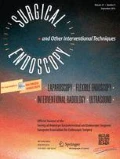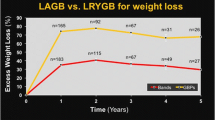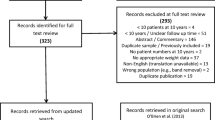Abstract
Introduction
Weight loss after laparoscopic adjustable gastric banding (LAGB) can be influenced by a variety of factors. The objective of this study is to investigate whether the maximum amount of previous weight loss with diet and exercise, prior to evaluation for bariatric surgery, is predictive of postoperative weight loss success among primary LAGB patients.
Methods
A retrospective cohort study was designed from a prospectively collected database at a single institution. Inclusion criteria consisted of age ≥18 years, initial body mass index (BMI) ≥35 kg/m2, intake information on the maximum weight loss at any time prior to referral to our bariatric practice, and at least 2 years of postoperative follow-up. Patients with prior bariatric surgery were excluded. Outcomes included mean % excess weight loss (EWL), percent that achieved weight loss success (%EWL ≥ 40), and percent with suboptimal weight loss (%EWL < 20) at 2 years post-LAGB.
Results
In the study, 462 primary LAGB patients were included. Mean previous weight loss was 29.7 lb (SD 27.6, range 0–175). These patients were divided into four previous weight loss groups (0, 1–20, 21–50, >50 lb) for analysis. In adjusted multivariate analyses, patients with >50 lb of maximum previous weight loss had a significantly higher mean %EWL, (p < 0.0001) and %BMIL (p < 0.0001), were more likely to reach weight loss success (≥40 % EWL, p = 0.047), and were less likely to experience suboptimal weight loss (<20 % EWL, p = 0.027) at 2 years postoperatively.
Conclusion
Previous weight loss appears to be a significant predictor of weight loss after LAGB. With multiple options for weight loss surgery, this study helps elucidate which patients may be more likely to achieve greater weight loss with the LAGB, allowing clinicians to appropriately counsel patients preoperatively.





Similar content being viewed by others
References
Matarese LE, Pories WJ (2014) Adult weight loss diets: metabolic effects and outcomes. Nutr Clin Pract 29:759–767
Tsai AG, Wadden TA (2005) Systematic review: an evaluation of major commercial weight loss programs in the United States. Ann Intern Med 142:56–66
Wadden TA, Bartlett S, Letizia KA, Foster GD, Stunkard AJ, Conill A (1992) Relationship of dieting history to resting metabolic rate, body composition, eating behavior, and subsequent weight loss. Am J Clin Nutr 56:203S–208S
Basciani S, Costantini D, Contini S, Persichetti A, Watanabe M, Mariani S, Lubrano C, Spera G, Lenzi A, Gnessi L (2015) Safety and efficacy of a multiphase dietetic protocol with meal replacements including a step with very low calorie diet. Endocrine 48:863–870
Bischoff SC, Damms-Machado A, Betz C, Herpertz S, Legenbauer T, Low T, Wechsler JG, Bischoff G, Austel A, Ellrott T (2012) Multicenter evaluation of an interdisciplinary 52-week weight loss program for obesity with regard to body weight, comorbidities and quality of life: a prospective study. Int J Obes (Lond) 36:614–624
Society of American Gastrointestinal and Endoscopic Surgeons (2008) SAGES guideline for clinical application of laparoscopic bariatric surgery. Surg Endosc 22:2281–2300
Gastrointestinal Surgery for Severe Obesity (1991) Consensus statement, National Institutes of Health Consensus Development Conference 9:1–20
Weichman K, Ren C, Kurian M, Heekoung AY, Casciano R, Stern L, Fielding G (2011) The effectiveness of adjustable gastric banding: a retrospective 6-year U.S. follow-up study. Surg Endosc 25:397–403
Kasza J, Brody F, Vaziri K, Scheffey C, McMullan S, Wallace B, Khambaty F (2011) Analysis of poor outcomes after laparoscopic adjustable gastric banding. Surg Endosc 25:41–47
Livhits M, Mercado C, Yermilov I, Parikh JA, Dutson E, Mehran A, Ko CY, Gibbons MM (2012) Preoperative predictors of weight loss following bariatric surgery: systematic review. Obes Surg 22:70–89
Ray EC, Nickels MW, Sayeed S, Sax HC (2003) Predicting success after gastric bypass: the role of psychosocial and behavioral factors. Surgery 134:555–563 discussion 563–554
Jantz EJ, Larson CJ, Mathiason MA, Kallies KJ, Kothari SN (2009) Number of weight loss attempts and maximum weight loss before Roux-en-Y laparoscopic gastric bypass surgery are not predictive of postoperative weight loss. Surg Obes Relat Dis 5:208–211
Gibbons LM, Sarwer DB, Crerand CE, Fabricatore AN, Kuehnel RH, Lipschutz PE, Raper SE, Williams NN, Wadden TA (2006) Previous weight loss experiences of bariatric surgery candidates: how much have patients dieted prior to surgery? Surg Obes Relat Dis 2:159–164
Shen R, Dugay G, Rajaram K, Cabrera I, Siegel N, Ren CJ (2004) Impact of patient follow-up on weight loss after bariatric surgery. Obes Surg 14:514–519
Ochner CN, Puma LM, Raevuori A, Teixeira J, Geliebter A (2010) Effectiveness of a prebariatric surgery insurance-required weight loss regimen and relation to postsurgical weight loss. Obesity (Silver Spring) 18:287–292
Talarico JA, Torquati A, McCarthy EM, Bonomo S, Lutfi RE (2010) Pre-Lap-Band group education in Medicaid population: does it really make a difference? Surg Obes Relat Dis 6:356–360
Wedin S, Madan A, Correll J, Crowley N, Malcolm R, Karl Byrne T, Borckardt JJ (2014) Emotional eating, marital status and history of physical abuse predict 2-year weight loss in weight loss surgery patients. Eat Behav 15:619–624
Acknowledgments
The authors wish to acknowledge Heekoung Youn, MA, for technical assistance and G. Craig Wood, MS, for leading the statistical analyses sited in this publication.
Disclosures
Dr. Christine Ren-Fielding previously received research grants (S# 06-851, S#10686) and an honorarium as a speaker for Allergan Medical, and is currently a consultant for Apollo Endosurgery. Dr. Fielding previously received an honorarium as part of the Speaker’s Bureau/Faculty, a research grant (S# 06-851, S#10686) and educational grant from Allergan Medical, and is currently on the Speaker’s Bureau for Apollo Endosurgery. Dr. Kurian received a research grant (S#06-851) and an honorarium as a speaker for Allergan Medical, an honorarium as a speaker for Apollo Endosurgery and is currently on the faculty of Gore. Dr. Schwack received an honorarium as a speaker for Allergan Medical. Dr. Sethi, Dr. Beitner, and Ms. Magrath have no conflicts of interest or financial ties to disclose.
Author information
Authors and Affiliations
Corresponding author
Rights and permissions
About this article
Cite this article
Sethi, M., Beitner, M., Magrath, M. et al. Previous weight loss as a predictor of weight loss outcomes after laparoscopic adjustable gastric banding. Surg Endosc 30, 1771–1777 (2016). https://doi.org/10.1007/s00464-015-4441-1
Received:
Accepted:
Published:
Issue Date:
DOI: https://doi.org/10.1007/s00464-015-4441-1




